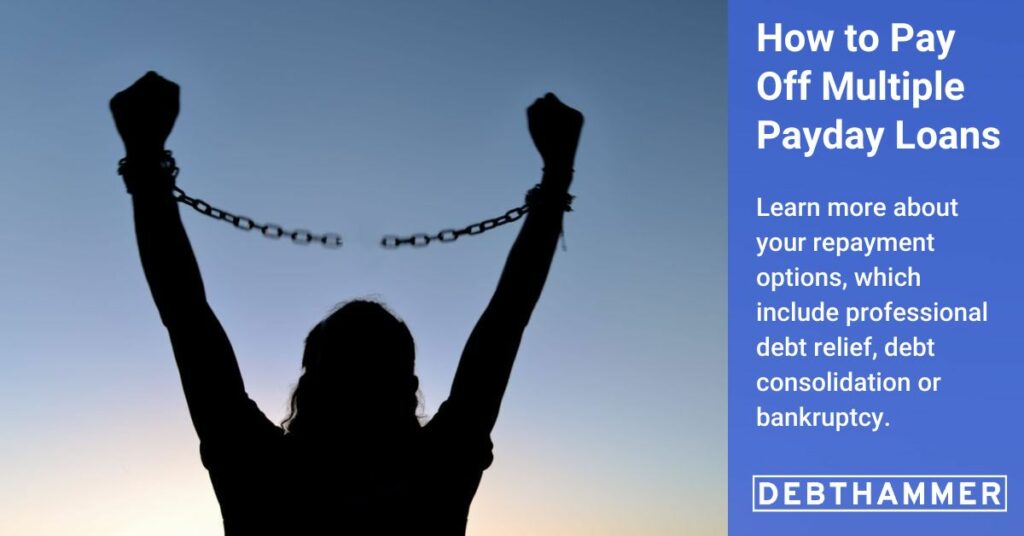If you have multiple payday loans and feel trapped in a seemingly endless cycle of debt, you’re not alone.
A recent survey shows 93% of respondents regret taking out their first payday loan. Additionally, 39% of those surveyed couldn’t afford to repay their loan on or before the due date. They had to take out at least one new loan to cover the first.
If you’re stuck with multiple loans, there are a few different ways to pay them off. The key is to figure out which method works best for you.
Dealing with multiple payday loans?
DebtHammer helps pay them off faster.
Table of Contents
Key points
- There are three primary ways to pay off multiple payday loans: Professional debt relief, debt consolidation or bankruptcy
- Debt consolidation will work for anyone who has a credit score that’s fair or better
- Professional debt relief programs will be able to help borrowers with more than $1,000 in payday loan debt
- Bankruptcy will work best for people with a large amount of debt who need a complete financial reset
- You must take action now before your situation worsens
How to pay off multiple payday loans
There are three primary ways to get out of payday loan debt.
1. Payday loan relief programs (professional help)
Best for: People with at least $1,000 in payday loan debt
Payday loan relief programs exist under many names, including payday loan consolidation programs, debt settlement programs and debt management programs.
Legitimate relief programs are run by professionals with a track record of helping people pay off multiple high-interest, short-term debts. Once you enroll, an expert will represent you and work with your lenders to reduce or settle your debts.
Sometimes, the company will negotiate directly with the lender to reduce the loan fees or interest rates. If negotiations are successful, you’ll repay less than the total amount you owe. Other times, they’ll help you get a new loan to pay off the total balance of your debts, and you’ll be left with a new loan you must repay over time.
Other times, they’ll help you get a new loan to pay off the total balance of your debts, and you’ll be left with a new loan you must repay over time.
READ MORE: How to get out of payday loan debt
Pro tip: Payday loan relief companies are prohibited by law from charging upfront fees. If your payday lenders refuse to negotiate and there are no settlements, you don’t have to pay the debt settlement company anything
READ MORE: Best payday loan relief programs
2. Payday loan debt consolidation
Best for: People with credit scores of 670 or higher
Debt consolidation rolls your high-interest loans into one new loan with a single payment, usually with a lower interest rate, higher loan amounts, and longer repayment periods.
There are two primary ways to do this: debt consolidation loans and balance transfer credit cards.
Debt consolidation loan (DIY debt settlement)
A debt consolidation loan is an unsecured personal loan used to combine multiple smaller debts. These loans have a lower interest rate than payday loans and come with a single, fixed monthly payment and term. This makes them easier to repay than several high-interest debts. Personal loans and home equity loans can also be used for debt consolidation.
To qualify for the best rates, you’ll either need good credit or a cosigner with good credit. Shop around for the best loan before applying.
READ MORE: Best debt consolidation loans for bad-credit borrowers
Balance transfer credit cards
A credit card balance transfer is where you move one high-interest debt to a new, low-interest account. These credit cards usually come with a 0% or low introductory APR that lasts 6 to 18 months. Some also come with a balance transfer fee that’s between 3% and 5% of the transferred amount.
Pro tip: You won’t be charged any additional interest if you pay off the entire balance before the period ends. However, if the card still carries a balance at that point, you might have to pay deferred interest.
Before getting a balance transfer credit card, use this calculator to ensure it’s a smart financial move. This calculator estimates your monthly payments based on the starting balance, balance transfer fee and annual percentage rate.
3. File for Chapter 7 bankruptcy
Best for: People whose income is low enough to pass the means test required for a Chapter 7 filing
Around 800,000 Americans declare bankruptcy every year. However, bankruptcy is a last resort and should only be done if advised by a lawyer. With Chapter 7, you can discharge certain debts, including payday loans and other unsecured debts.
Keep in mind that filing for bankruptcy comes at a high cost, and not just financially. It could result in wage garnishment the seizure of your assets. It also stays on your credit report for 7 to 10 years and will ruin your credit score. It will become more difficult to qualify for loans during that time, and though some financial services offer loans for people who have filed for bankruptcy, the interest rates will be very high. That said, if you need a complete financial reset, it could be your best option to clear the slate and get a fresh start. Laws that govern bankruptcy vary by state, so speak with a professional about your rights and what you can expect before filing.
READ MORE: Types of bankruptcy explained
Why payday loan consolidation or relief works
If you’re stuck in the payday loan cycle, payday loan consolidation or a relief program can help in several ways. Some of the key benefits include:
Reduced fees and lower interest rates
Payday loans usually come with astronomical interest rates. It’s common to find APRs ranging from 300% to 400%. For context, a standard credit card or personal loan usually caps out at between 20% and 30% APR.
Considering the high interest rate of payday loans, it’s no wonder why many people fall into the payday debt trap. But with a credit consolidation service or personal loan, you can save hundreds or thousands of dollars throughout the loan’s lifetime.
READ MORE: Payday loan interest rates
Longer repayment terms
Every other type of loan will have more flexible repayment terms that last from a month all the way up to 30 years (in the case of home loans.) Traditional lenders are also usually more willing to work with borrowers to adjust the plan based on their budget.
While longer loan terms typically mean paying more in interest over time, it also means more affordable monthly payments. This makes it easier to avoid defaulting on these loans.
Fixed monthly payments
Payday loans can quickly become complicated, especially for those who roll over previous loans into new ones. With debt consolidation, you’ll only need to keep up with one straightforward payment plan and pay a fixed monthly amount. As long as the loan covers the full balance of your short-term loans, this can alleviate financial stress for those in over their heads with payday loans.
Alternatives to debt consolidation
Although debt consolidation can work, it’s not the only way to pay off multiple payday loans. If you can’t get approved for a personal loan or don’t have enough debt to qualify for a debt relief program, here are several other options that can help.
Ask for an extended payment plan (EPP)
If you live in Alabama, Alaska, California, Delaware, Florida, Idaho, Indiana, Louisiana, Nevada, South Carolina, Utah, Washington, Wisconsin, and Wyoming, payday lenders in your state are required to offer a no-fee extended payment plan. Michigan and Oklahoma allow lenders to charge a small fee per plan.
When searching for a payday lender, look for members of the Community Financial Services Association of America. All CFSAA members are required to offer EPPs.
Pro tip: Though states require lenders to offer EPPs, they are not required to provide you with information about the plans. You will need to request an EPP from your lender, and you will need to do it at least one day before your loan’s due date.
READ MORE: Payday Loan Extended Payment Plans
Work with a credit counselor
Nonprofit credit counseling agencies have certified credit counselors who will work with you to navigate your finances and get a handle on your debts. These companies often offer general credit counseling and Debt Management Plans (DMPs).
DMPs are 3- to 5-year plans that combine your eligible unsecured debts into one monthly plan. You must make regular, on-time payments to the associated account until the enrolled debts are fully repaid. These plans usually come up with a small startup fee and a monthly fee of $25 to $75.
READ MORE: Debt settlement vs. debt management
Pro tip: Credit counseling agencies work primarily with credit card debt. If you have a large amount of medical bills, personal loans, student loans or other unsecured debt, credit counselors usually will not be able to help with those. In that case, debt settlement would be the better option.
For a list of approved credit counseling agencies, visit the United States Department of Justice’s official website.
Talk to a legal aid attorney
If you still don’t have a way to repay your loans, find a lawyer who’s well-versed in debt settlement and request a free consultation. A good lawyer can explain your rights as a consumer and advise you on how to get out of your payday loan problem. Some will work with you at a reduced fee.
Pro tip: The Consumer Finance Protection Bureau has compiled a list of legal aid attorneys in every state. You can also contact your state’s bar association for a lawyer referral service in your area.
READ MORE: Do you need a debt settlement attorney?
More options for payday loan help
Instead of taking out a payday loan, consider alternatives like cash advance apps or payday alternative loans (PALs).
- Cash advance apps
- Installment loans
- Peer-to-peer loans
The bottom line
If you’re having trouble paying off multiple payday loans, you’re not in this alone. There are several legitimate ways to manage or reduce your debts, including debt settlement and debt consolidation. The key is to choose a strategy and stick to it. Before you know it, you’ll be debt-free.
DebtHammer: Legitimate payday loan relief that works
Getting out of debt isn’t easy, but we’re here for you every step of the way. We can help you negotiate with your lenders with an easy-to-understand plan with no hidden fees or “gotchas” and offer a simple monthly payment plan. Click here to start your free consultation.


